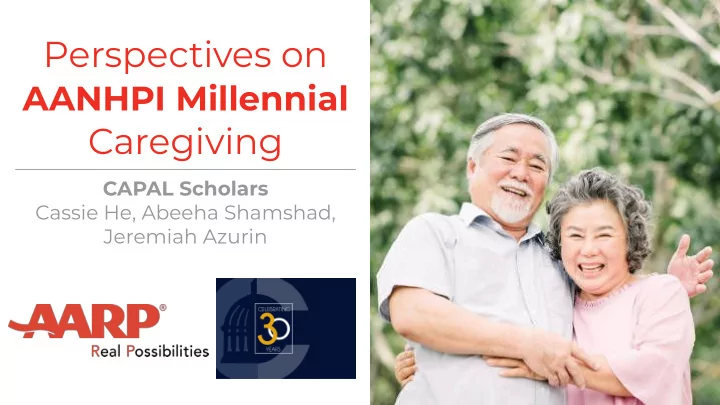

Perspectives on AANHPI Millennial Caregiving CAPAL Scholars Cassie He, Abeeha Shamshad, Jeremiah Azurin
● Nation’s largest nonprofit, To empower people to choose nonpartisan organization with 38 how they live as million members they age ● Dedicated to empowering Americans 50 and older to choose how they live as they age
Cassie He Jeremiah Azurin Abeeha Shamshad Dsds Student at OSU Student at Harvard ● ● Student at UPenn ● Intern at NGA Intern at the State ● ● Intern at USAID ● Dept
1. Goals and Purpose What insights are we trying to gain?
● About 40 million American adults are caregivers What is the ● ¼ caregivers are part of the data millennial generation missing? ● On average millennial caregivers provide more than 20 hours of care per week ● More than half of millennial caregivers are people of color Source: Millenials and Caregiving? Yes it’s a thing, May 2018.
Our Purpose What do AANHPI millenials know about caregiving? What do AANHPI millennials anticipate about their caregiving experience? Do AANHPI millennials care about caregiving?
2. Process How did we gain our insights?
Definitions - Caregiving/elder care - Providing unpaid care to an adult relative or friend to help them take care of themselves. This may include helping with personal needs or household chores. It might be managing a person's finances, arranging for outside services, or visiting regularly to see how they are doing. This could include care for an ongoing medical condition, a serious short-term condition, emotional or behavioral problems, or developmental problems. Source: Millennials: The Emerging Generation of Family Caregivers, May 2018.
Survey Questions What does elderly caregiving look like to you? Are you expected to provide care to an elderly loved one (ie parent, grandparent, older guardian, etc) over the age of 50? What, if any, resources and information do you plan on using? OPTIONAL: Share any and all thoughts. Consider: Are you expected to alter your professional/personal life to be a caregiver? Do you want to be a caregiver?
3. Insights What did we learn?
AANHPI millenials have a broad understanding of what caregiving means Trend 1: “ Driving them to appointments, providing & feeding meals, bathing them” Broad Understandings “Making phone calls and interpreting for the person” of “Caregiver” “ Keeping track of their health, their prescription and other needs” “Providing time, money, and physical support ” “Starting the conversation early” “ Checking in with them. Providing them love and attention ” “Aiding older relatives navigate all of the challenges of life whether that is everyday tasks or larger issue”
Everyday tasks Major Assistance Phone calls and Tracking health What does interpretation and medication caregiving look like? Emotional Support It’s Not Easy. Checking in, Complex topic providing love and attention Vaires
Are you expected to be a caregiver? Probably.
Most AANHPI millennials are expected to become caregivers... Trend 2: Caregiving is Assumed, not Asked of AANHPI Millennials Source: Caregiving Among Asian Americans and Pacific Islanders Age 50+ AARP, November 2014. Source: Belden, Russonello & Stewart and Research/Strategy/Management, 2001. “In the Middle: A Report on Multicultural Boomers Coping With Family and Aging Issue”. AARP Research Report.
… and more ultimately become caregivers. Trend 2: Caregiving is Assumed, not Asked of AANHPI Millennials Source: Caregiving Among Asian Americans and Pacific Islanders Age 50+ AARP, November 2014.
Do you have any caregiving resources ? Where have you gotten your information from? Is this reliable information ?
Most AANHPI millennials have no resources , or rely on informal Trend 3: knowledge Lack of Resource Familiarity Most common answer we got was that they don’t know of any resources Few people mentioned AARP Friends, family, cultural resources
If you had to become a caregiver tomorrow, how would it change your life? School? Friends? Where you live? How you spend your money and time? Your future?
Many AANHPI millennials are expected to alter their professional/personal life to be a caregiver and already have - though not everyone wants to Trend 4: be a caregiver. Many will alter their lives for “It takes time away from work and my personal days off.” caregiving “There are some gender roles imparted on me, as a female, so I am expected to be a housewife as well. With that, being a caregiver may be a role I have to take on.” “I have altered college/career goals to serve this role.” “I also hope that i will make the decision to alter my life at least a little, if someone in my family requires that.” “I will... have to move back to my hometown.”
Do you feel pressured to become a caregiver?
For many AANHPI millennials, there is cultural pressure to be a caregiver Trend 5: “ Filial piety is a strong value in the family. I… will alter my Cultural Pressure life... to be a caregiver .” “Caregiving isn't a requirement..., but I have collectivist ideals … I value. Unluckily, I find that myself and many others in my family take on caregiving when it's "too late."” “ I have altered college/career goals … I do not see this as a distinct negative, but rather as a part of being a good daughter and granddaughter and expressing my gratitude for the sacrifices they made for me in the best way.”
Conclusion What are the needs of AANHPI millennial caregivers?
THANK YOU! Ryann Tanap and Scott Tanaka All AARP staff All those who responded to our survey & CAPAL
Questions?
Recommend
More recommend